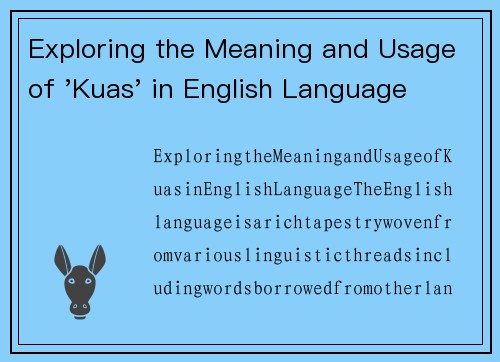Exploring the Meaning and Usage of 'Kuas' in English Language
The English language is a rich tapestry woven from various linguistic threads, including words borrowed from other languages. One such word that has gained attention in recent years is "kuas." While it may not be a term that is widely recognized, its usage and meaning are intriguing, especially in the context of cultural exchange and linguistic evolution. This article aims to explore the meaning and usage of "kuas," delving into its origins, applications, and significance in contemporary English.
The Origin of 'Kuas'
The term "kuas" is derived from the Malay language, where it means "to have" or "to possess." In its original context, it conveys a sense of ownership or control over something. As English continues to evolve and incorporate words from other languages, "kuas" has found its way into various contexts, particularly in discussions surrounding cultural identity, ownership, and even in the realm of social media.
The Cultural Significance of 'Kuas'
In many cultures, the concept of possession is deeply intertwined with identity. The word "kuas" reflects not just the act of having something but also the emotional and cultural ties that come with ownership. For instance, in discussions about cultural heritage, the term can be used to express the importance of preserving traditions and practices that define a community. This cultural significance is crucial in understanding how "kuas" is used in modern English discourse.
Usage in Contemporary English
In contemporary English, "kuas" is often used in informal settings, particularly among younger generations who are more inclined to adopt and adapt words from various languages. Social media platforms have played a significant role in this linguistic evolution, as users frequently incorporate terms like "kuas" to express their feelings of ownership or control over certain aspects of their lives. For example, a person might post a picture of a new car with the caption, "Finally got my kuas!" This usage highlights the blend of cultural influences that characterize modern communication.
'Kuas' in Academic Discourse
While "kuas" is primarily used in informal contexts, it has also made its way into academic discussions, particularly in fields such as linguistics, cultural studies, and sociology. Scholars examine how borrowed words like "kuas" reflect broader societal changes and the dynamics of cultural exchange. The study of such terms can provide insights into how language evolves and adapts to new cultural realities, illustrating the fluid nature of linguistic identity.

The Role of 'Kuas' in Identity Formation
The usage of "kuas" can also be linked to identity formation, particularly among individuals from multicultural backgrounds. For many, the act of using a word from their heritage can serve as a powerful affirmation of their identity. It allows them to assert their cultural roots while navigating the complexities of a globalized world. In this sense, "kuas" becomes more than just a word; it transforms into a symbol of pride and belonging.
Challenges in Understanding 'Kuas'
Despite its growing popularity, the term "kuas" can pose challenges for those unfamiliar with its origins or cultural context. Misunderstandings may arise when individuals use the word without fully grasping its significance. This highlights the importance of cultural sensitivity and awareness in language use. As "kuas" continues to permeate English, it is essential for speakers to understand the nuances associated with it to avoid miscommunication.
The Future of 'Kuas' in English
As language is inherently dynamic, the future of "kuas" in English remains uncertain. It may continue to evolve, gaining new meanings and applications as it is adopted by different communities. The influence of social media and globalization will likely play a significant role in shaping its trajectory. Whether "kuas" becomes a permanent fixture in the English lexicon or fades into obscurity will depend on how speakers choose to embrace and utilize the term.
Conclusion
In conclusion, the exploration of "kuas" in the English language reveals much about the interplay between language, culture, and identity. As a borrowed term, it serves as a reminder of the rich tapestry of influences that shape our communication. Understanding its meaning and usage not only enhances our linguistic repertoire but also fosters greater cultural appreciation and sensitivity. As we continue to navigate an increasingly interconnected world, words like "kuas" will undoubtedly play a role in bridging cultural divides and enriching our shared experiences.
红杏视频在线观看Frequently Asked Questions
What does "kuas" mean?
- "Kuas" is a Malay word meaning "to have" or "to possess," often used to express ownership or control.
Where did the term "kuas" originate?
- The term originates from the Malay language, which is spoken in Malaysia and Indonesia.
How is "kuas" used in modern English?
- "Kuas" is often used informally, particularly on social media, to express feelings of ownership or pride.
Is "kuas" commonly recognized in English?
- While it is not widely recognized, its usage is growing, especially among younger generations and in multicultural contexts.
What cultural significance does "kuas" hold?
- "Kuas" reflects the emotional and cultural ties associated with ownership and identity, particularly in discussions about cultural heritage.
Can "kuas" be used in academic discussions?
- Yes, scholars examine "kuas" in the context of linguistics and cultural studies to understand its implications in language evolution.
How does "kuas" relate to identity formation?
- Using "kuas" can affirm one's cultural identity, especially for individuals from multicultural backgrounds.
What challenges arise from using "kuas"?
- Misunderstandings may occur if individuals use the term without understanding its cultural context, highlighting the need for cultural sensitivity.
What is the future of "kuas" in the English language?
- The future of "kuas" is uncertain, but it may continue to evolve and gain new meanings as it is adopted by different communities.
bilibiligoogle:探索B站与谷歌的奇妙结合与未来发展潜力
bilibiligoogle:探索B站与谷歌的奇妙结合与未来发展潜力 在当今数字化时代,内容创作与分享平台如雨后春笋般涌现,而B站(哔哩哔哩)与谷歌(Google)则是其中的佼佼者。B站以其丰富的二次元文化、弹幕互动和年轻用户群体而闻名,而谷歌则是全球最大的搜索引擎和信息获取平台。两者的结合,形...
hs0005kcu11h:探索这一独特编码背后的秘密与应用价值
hs0005kcu11h:探索这一独特编码背后的秘密与应用价值 在当今信息化迅速发展的时代,编码技术已经渗透到我们生活的方方面面。无论是数据传输、信息存储,还是产品标识,编码都扮演着至关重要的角色。在众多编码中,hs0005kcu11h这一独特的编码引起了人们的广泛关注。本文将深入探讨这一编码背...